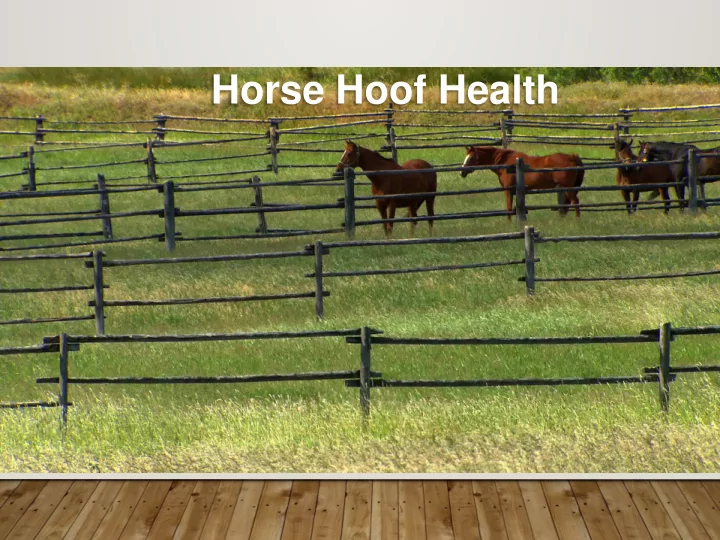

Horse Hoof Health
THREE VECTORS FOR HORSE HOOF HEALTH JANE BURROWS, DPT, HPCS
THREE VECTORS FOR HORSE HOOF HEALTH Jane Burrows, DPT, HPCS Ø Doctorate in Physical Therapy Ø Horses in my prac;ce for 15 years Ø Pediatrics and adults Ø Special Strides, Monroe, NJ
THREE VECTORS FOR HORSE HOOF HEALTH Duke and Dollie Bobby and Beaux
THREE VECTORS FOR HORSE HOOF HEALTH
THREE VECTORS FOR HORSE HOOF HEALTH
THREE VECTORS FOR HORSE HOOF HEALTH Learning objectives: • Identify three supporting factors for horse hoof health • Identify a horse’s nutritional state thru Body Condition Score • Identify the relationship between stress and exercise • Identify important landmarks and relationships within the hoof anatomy • Identify three possible triggers for laminitis
THREE VECTORS FOR HORSE HOOF HEALTH • One of the most debilitating hoof ailments is laminitis • Laminitis is inflammation of the sensitive structures in the hoof called the lamellae. The lamellae are the means by which the coffin bone is held tight within the hoof capsule. • Untreated laminitis often leads to Founder when the coffin bone becomes detached from the hoof capsule and in severe cases will penetrate through the sole.
THREE VECTORS The horse’s hoof is affected by: • Nutrition • Exercise • Hoof Care
HOW DOES NUTRITION AFFECT THE HOOF? • Body condition score • NRC recommendations • Hidden traps in your feeding program • Greener grass isn’t always better • Better to know than to guess
BODY CONDITION SCORE SHEET
NATIONAL RESEARCH COUNCIL (NRC) • Recommendations for horses appropriate to your situation • Non-Structured Carbohydrates (NSC), Protein, Important trace minerals
NATIONAL RESEARCH COUNCIL (NRC) • Domesticated horses do not feed seasonally and this may promote chronic health problems such as: Laminitis, IR • Insulin Resistance (IR) responds positively to low input diet
NATIONAL RESEARCH COUNCIL (NRC)
NATIONAL RESEARCH COUNCIL (NRC)
NATIONAL RESEARCH COUNCIL (NRC)
NATIONAL RESEARCH COUNCIL (NRC)
NATIONAL RESEARCH COUNCIL (NRC)
NATIONAL RESEARCH COUNCIL (NRC) • http://nrc88.nas.edu/nrh/ • https://www.nap.edu/read/11653/chapter/1
MYTHS OF HORSE NUTRITION • Alfalfa is the best hay to feed • My horses need a full measure of feed to get all the trace elements • The best time to graze a pasture is in the early afternoon when the dew has dried off
THE GRASS IS ALWAYS GREENER… • Close cropped grass vs longer grass • Green grass vs brown grass • Grass vs weeds Hidden traps • Native pastures vs improved • Variety is the spice of life
TEST – DON’T GUESS • T esting is expected in the dairy industry • T esting is not expensive • T est at least seasonally • T est: http://www.equi-analytical.com/ • http://www.foragetesting.org/index.php?page=certified_labs
HOW DOES EXERCISE AFFECT THE HORSE’S HOOF? • Hoof pump mechanism • How much exercise is enough? • Exercise and attitude (cortisol)
HOOF PUMP MECHANISM
HOOF PUMP MECHANISM
HOOF PUMP MECHANISM
HOOF PUMP MECHANISM
HOW MUCH IS ENOUGH
EXERCISE AND ATTITUDE • The researchers conclude that exercise reduces stress levels in horses even “in cases where riders are clumsy or lack appropriate horse-riding experience” and… • “resting without any particular exercise can also increase the stress levels in horses.” Reference : “Changes in salivary cortisol concentration in horses during different types of exercise,” Asian-Australasian Journal of Animal Sciences, May 2016 This article first appeared in EQUUS issue #466, July 2016.
EXERCISE AND ATTITUDE • Typical system events • Eat Insulin release Glucose into cells Leptin release Satisfaction at Hypothalamus
EXERCISE AND ATTITUDE Stress cortisol insulin leptin • Stress produces inflammation thru release of Cortisol • Cortisol causes insulin resistance and fat retention • Increased body fat releases cytokines • The brain can become resistant to leptin thru damage to the hypothalamus
EXERCISE AND ATTITUDE • Stress cortisol insulin leptin • Exercise increases insulin sensitivity and lessens inflammatory cytokines. [xiv] It has also been shown to directly reduce hypothalamic inflammation. [xv] [xiv] Liburt, N.R., Fugaro, M.N., Wunderlich, E.K., et. al., 2011. The effect of exercise training on insulin sensitivity and fat and muscle tissue cytokine profiles of old and young Standardbred mares. Journal of Equine Veterinary Science, 31 (5-6), 237-238. [xv] Yi, C.X., Al-Massadi, O., Donelan, E., et. al., 2012. Exercise protects against high-fat diet-induced hypothalamic inflammation. Physiology & Behavior, 106(4), 485-490.
EXERCISE AND ATTITUDE Stress can come from many sources – • stall confinement, • isolation from buddies, • change in environment, • travel to strange locations, • excessive training and performing, • pain and illness,
EXERCISE AND ATTITUDE • and the most stressful of all – not being allowed to graze on forage at all times. Forage restriction is incredibly stressful.[ii] Putting the horse on a “diet” by limiting the amount of hay he can have will create a chain of chemical reactions that prevent the very outcome the “diet” was meant to ensure. [ii] Getty, J.M. 2014. Restricting forage is incredibly stressful. Choose a different method to help your horse lose weight. http://gettyequinenutrition.biz/library/restrictingforageisincrediblystressful.htm
HOW DOES THE TRIM AFFECT THE HORSES HOOF? • Internal hoof anatomy • Relationships • Frog to sole • Coffin bone to level • Collateral groove depth • Wear patterns
HOW DOES THE TRIM AFFECT THE HORSES HOOF?
HOW DOES THE TRIM AFFECT THE HORSES HOOF?
HOW DOES THE TRIM AFFECT THE HORSES HOOF?
HOW DOES THE TRIM AFFECT THE HORSES HOOF?
HOW DOES THE TRIM AFFECT THE HORSES HOOF?
HOW DOES THE TRIM AFFECT THE HORSES HOOF?
HORSE HOOF HEALTH • Causes of Laminitis • High intake of soluble carbohydrates (sugars and starch) ... • Stress. ... • Severe infection. ... • Obesity. ... • Concussion. ... • Cushing's disease. ...
HORSE HOOF HEALTH • What to do? • Nutrition – maintain appropriate weight, monitor NSC intake in pasture grazing, a test is best • Exercise – not just for conditioning but for stress reduction • Hoof trim – Shod or unshod it starts with an appropriate trim; familiarize yourself with what a healthy hoof looks like
Horse Hoof Health
Recommend
More recommend